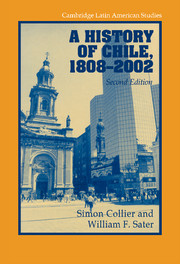Book contents
- Frontmatter
- Contents
- List of maps
- Preface to the Second Edition
- A note on geography
- CAMBRIDGE LATIN AMERICAN STUDIES
- PART I Birth of a nation-state, 1800s–1830s
- 1 Colonial foundations, 1540–1810
- 2 Independence, 1808–30
- 3 The conservative settlement, 1830–41
- PART II The rise of a republic, 1830s–1880s
- PART III The nitrate era, 1880s–1930s
- PART IV Industrial advance and the dawn of mass politics, 1930s–1960s
- PART V Democracy and dictatorship, 1960s–2000s
- Glossary of Spanish terms
- Initials and acronyms
- Further reading
- Index
2 - Independence, 1808–30
Published online by Cambridge University Press: 05 June 2012
- Frontmatter
- Contents
- List of maps
- Preface to the Second Edition
- A note on geography
- CAMBRIDGE LATIN AMERICAN STUDIES
- PART I Birth of a nation-state, 1800s–1830s
- 1 Colonial foundations, 1540–1810
- 2 Independence, 1808–30
- 3 The conservative settlement, 1830–41
- PART II The rise of a republic, 1830s–1880s
- PART III The nitrate era, 1880s–1930s
- PART IV Industrial advance and the dawn of mass politics, 1930s–1960s
- PART V Democracy and dictatorship, 1960s–2000s
- Glossary of Spanish terms
- Initials and acronyms
- Further reading
- Index
Summary
Live with honor, or die with glory!
– Bernardo O'Higgins (1813)The timing of the independence of the captaincy-general (and most of the rest of Spanish America) was due entirely to the great upheaval of the Napoleonic wars in Europe. In May 1808, having forced the Spanish King Charles IV to abdicate, Napoleon deposed and banished the new king, Ferdinand VII, and placed his own brother Joseph on the Spanish throne. Spaniards rose in ferocious resistance to the “intruder king” and the French armies pouring into their country. Authority in what was left of free Spain passed spontaneously to a series of local juntas, a Central Junta at Cadiz emerging as the effective government, though early in 1810 this was replaced by a Council of Regency. Spanish radicals and reformers (the first politicians in the world to bear the honorable name of liberals) seized this opportunity to secure a constitution (1812) transforming Spain into a constitutional monarchy. These extraordinary political changes were overshadowed by the shifting fortunes of the Peninsular war, as Spanish guerrillas and their newfound British allies set about driving the French from Spain, a task completed in 1814.
The news of these events spread consternation throughout Spanish America. In Chile, where the news of Ferdinand VII's dethronement arrived in September 1808, the immediate reaction was to express intense, fervent loyalty to the motherland in its hour of catastrophe.
- Type
- Chapter
- Information
- A History of Chile, 1808–2002 , pp. 32 - 50Publisher: Cambridge University PressPrint publication year: 2004

